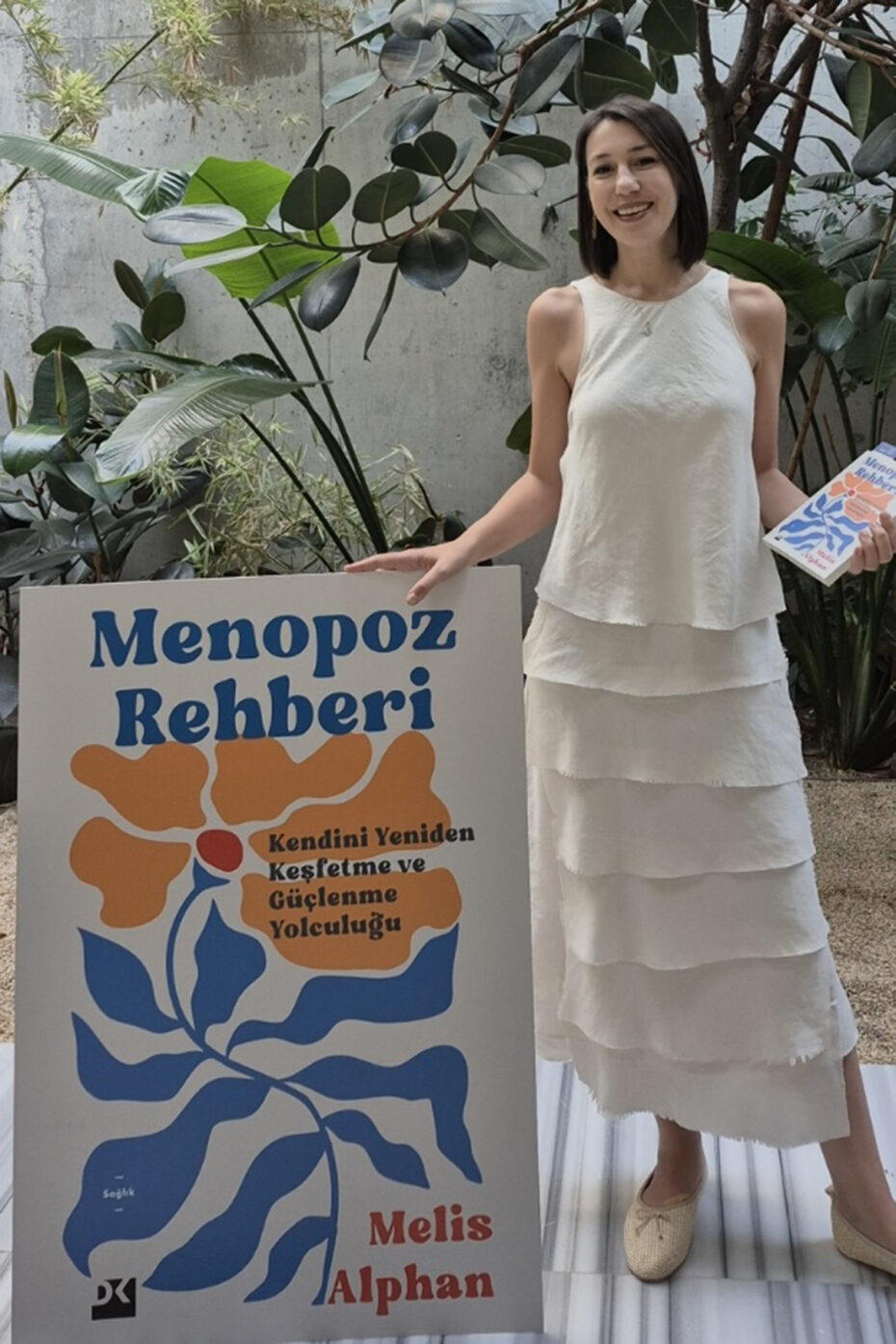
Photo: Melis Alphan
Stories
What Really Happens When You Finally Talk About Menopause
Journalist Melis Alphan is breaking the silence around menopause, turning shame and confusion into knowledge and solidarity. In this candid conversation, she shares how her journey through surgical menopause inspired her book and why this stage of life can become a moment of power, clarity, and connection.
Text Seda Yılmaz
Menopause is a universal experience for women, yet it’s still treated like a secret, and often treated like the end of something. It’s whispered about, dismissed, or framed as a quiet closing chapter. Journalist and author Melis Alphan knows this silence all too well. After entering surgical menopause, she set out to learn everything she could—and to speak openly about the physical, emotional, and cultural sides of this life stage.
Through her Instagram account Menopoz Seyir Defteri and her book, she’s created a space where women can finally see themselves reflected, understood, and supported. Here, she shares how her perspective shifted from fear to empowerment, and why menopause deserves to be talked about with the same honesty and attention as every other stage of a woman’s life.
You entered menopause after a hysterectomy and oophorectomy. How did you navigate that sudden shift?
If natural menopause is like slowly crossing a bridge, surgical menopause is like falling off a cliff. You go into surgery in the morning, and by the time you wake up, your ovaries are gone and your hormone levels have dropped dramatically.
I didn’t realize how much my hormones shaped how I felt until they were gone. For weeks, I felt like I was living behind frosted glass—physically present, but dimmed. It wasn’t just my hormones that disappeared. I felt like I had disappeared, too.
But in time, I began to rebuild. Hormone therapy, movement, nutrition, and most importantly, listening to myself helped me recalibrate. Surgical menopause forced me to meet my body and my life with new awareness. It wasn’t easy, but it was deeply transformative.
What led you to write a book about menopause?
Before my surgery, I knew almost nothing. I thought, “Let me get through this operation first. I’ll figure out the rest later.” But afterward, I felt like I had been dropped into a sea of unknowns. My body was changing overnight, my emotions were everywhere, and no one around me seemed to know how to help.
Then I started reading about the menopause movement in the West, led by women doctors. That’s when it hit me: estrogen loss doesn’t just cause hot flashes. It affects bone density, cardiovascular health, brain function, even digestion. And yet in Turkish, almost no resources existed.
So I started sharing what I was learning on Instagram. Very quickly, my inbox filled with “I feel the same, but I’ve never told anyone.” That wave of connection led to my book. I wanted to create something that felt like a friend and a guide at the same time. Knowledge is power, but sharing it makes the journey less lonely.
Instead of silencing emotions, I’ve learned to listen to them. They’re just messages from the body as it transitions.
In your book, you talk about how menopause reveals the way the female body has been overlooked in medicine. How so?
Historically, the male body was treated as the default. The female body was seen as an exception. That bias left massive gaps in research about life stages that only affect women, like menopause.
For decades, women weren’t included in clinical studies. Take the 2002 Women’s Health Initiative study, which sparked panic about hormone therapy. Most participants were over 60, and the study had serious flaws—but it scared an entire generation away from treatment.
When menopause is ignored, the consequences are real: osteoporosis, heart disease, Alzheimer’s. The system still acts like a woman’s life ends with fertility, even though we now live 30 or 40 years post-menopause. Ignoring that is both a scientific and social blind spot.
How can we better prepare for menopause?
Most of us know menopause is coming, but it stays abstract until it arrives. Preparation starts with awareness. From around 35, you can start paying closer attention to your body. Irregular sleep, anxiety, trouble focusing, changes in weight or cycles—these can be early signs.
Simple blood work can help create a roadmap. Movement matters too, especially strength training, because muscle is our best ally for bone health as estrogen declines.
But preparation isn’t just medical. It’s about lifestyle. How we eat, move, sleep, handle stress, and nurture relationships all shape this experience. Menopause isn’t a downfall. It’s a transition. Knowledge helps you meet it with confidence instead of fear.
Compassion starts with curiosity. Ask your body, “What are you adjusting to?” Let go of comparisons to your younger self or to others.
There’s still stigma around menopause. How do we change that?
The biggest myth is that menopause marks the end of a woman’s vitality. That she’s no longer desirable, needed, or productive. But women are living longer than ever.
Post-menopause can span a third of our lives. That is not the end.
To change the story, we first have to talk. Silence is the root of shame. Every time a woman shares her story, another woman feels seen. We need more visibility in media, in healthcare, and in culture. We need to show women living fully and brilliantly in this stage of life.
Many women mainly notice weight changes. How can we approach these shifts with more compassion?
Bodies change in menopause. Muscle decreases, metabolism slows, and hormones fluctuate. But we’re conditioned to see those changes as personal failure instead of biology.
Compassion starts with curiosity. Ask your body, “What are you adjusting to?” Let go of comparisons to your younger self or to others. When we understand what’s happening, we stop turning against ourselves.
Movement also helps—not to punish, but to reconnect. Walking, dancing, stretching, even simple breathwork makes you feel more at home in your own skin. Menopause can be a moment to rebuild trust with the body that carries you.

What has your Instagram community taught you about other women’s experiences?
When I started Menopoz Seyir Defteri, I just wanted to document my experience and feel less alone. What I learned is that so many women feel isolated.
Messages poured in: “I feel the same. I’ve just never said it.” The silence is what makes menopause so heavy. But the moment women connect and say “me too,” everything shifts.
Even though symptoms vary—night sweats, insomnia, sudden tears, not recognizing yourself in the mirror—there’s a shared emotional ground. Solidarity makes the load lighter.
Historically, the male body was treated as the default. The female body was seen as an exception. That bias left massive gaps in research about life stages that only affect women, like menopause.
How do you navigate the emotional side of menopause?
Hormonal changes can bring anxiety, mood swings, tears, even anger or withdrawal. It can feel like a storm. The first step is knowing it’s not weakness, and it won’t last forever.
Support is everything. Honest conversations with friends, therapy, or joining spaces where women share this experience can be grounding.
And lifestyle matters more than we realize. Gentle, consistent movement, good sleep, and mindful stress relief can stabilize the nervous system. Instead of silencing emotions, I’ve learned to listen to them. They’re just messages from the body as it transitions.
The biggest myth is that menopause marks the end of a woman’s vitality. That she’s no longer desirable, needed, or productive. But women are living longer than ever. Post-menopause can span a third of our lives.
You mention that you weren’t into exercise in your thirties. How did that change after menopause?
I thought exercise was just for losing weight. Since I was slim, I didn’t bother. But after forty, I felt my muscles weaken and the weight creeped in. After surgery, I learned that movement isn’t optional in menopause.
Exercise strengthened my body and lifted my mood. My posture improved, my sleep got deeper, my body felt like it was on my side again. I don’t move to discipline my body anymore—I move to support it. That mindset shift has been life-changing.
Did your skincare routine change, too?
Yes, right after surgery, my skin was so dry that any cream I applied would vanish instantly. It felt like my skin was drinking it in. I had to simplify, find one product that really worked, and be consistent.
I also get occasional treatments and mesotherapy, but my daily routine is just one trusted moisturizer. Over time, as my hormones balanced and I started getting estrogen through my skin, the extreme dryness eased. Today, my skin feels healthy again.





